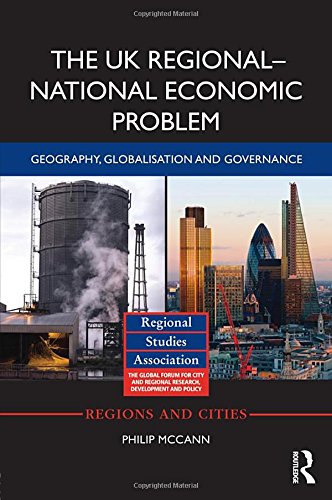In The UK Regional-National Economic Problem: Geography, Globalisation and Governance, Philip McCann analyses growing economic disparity across the UK regions, including the North-South divide, challenging many of the key assumptions that have shaped understandings of the UK’s ‘regional problem’. While a dense read, this is a convincing challenge to the dominant orthodoxy on regional development in the UK that John Tomaney hopes will generate wider debate.
The UK Regional-National Economic Problem: Geography, Globalisation and Governance. Philip McCann. Routledge. 2016.
 The UK Regional-National Economic Problem: Geography, Globalisation and Governance is an important book which brings fresh, well-founded and challenging insights to the UK regional problem. It synthesises much existing literature and analyses data from an array of sources using a range of analytical techniques to set the UK case in comparative perspective. It questions the ruling popular orthodoxies in UK urban and regional policy and their underpinning theories. It is also especially timely in light of the recent UK referendum on EU membership. One of the most striking features of the Leave vote was its geography, leading to discussion about the extent to which it reflected the geography of regional ‘winners’ and ‘losers’ in relation to recent social and economic changes, highlighting the political salience of this book.
The UK Regional-National Economic Problem: Geography, Globalisation and Governance is an important book which brings fresh, well-founded and challenging insights to the UK regional problem. It synthesises much existing literature and analyses data from an array of sources using a range of analytical techniques to set the UK case in comparative perspective. It questions the ruling popular orthodoxies in UK urban and regional policy and their underpinning theories. It is also especially timely in light of the recent UK referendum on EU membership. One of the most striking features of the Leave vote was its geography, leading to discussion about the extent to which it reflected the geography of regional ‘winners’ and ‘losers’ in relation to recent social and economic changes, highlighting the political salience of this book.
The ruling orthodoxy draws on axioms of the new urban economics and series of (not always consistent) policy shibboleths that stress how agglomeration processes and urban density create spillovers that are the chief source of productivity growth. In this orthodoxy, London is an exemplar that other UK cities should emulate. Urban areas, it is stated, are growing faster than their hinterlands, but need to grow faster to contribute to rebalancing the UK’s economic geography. Policy has become focused on this objective, most notably by loosening land-use planning regulations, promoting metro-mayors and ad hoc City and Devolution Deals.
McCann’s evidence challenges most of these axioms. Relying heavily on the OECD’s statistical database and examining the last thirty years, Chapter Two shows that regional inequalities in the UK are especially large by international standards. Regions outside of London and the South have productivity levels akin to poor regions in Central and Eastern Europe or the US South. Moreover, disparities are growing. Only Scotland, outside of London and the South, has performed relatively strongly. The UK economy’s poor recent productivity performance has vexed policymakers, and McCann argues convincingly that it is largely an urban and regional problem. London’s economic performance contributes to national averages that disguise the weaknesses in other regions. There is little evidence that other regions benefit from London’s growth. Instead, fortuitously capturing the benefits of globalisation through its specialisation in financial services, the attraction of multinational companies, foreign direct investment and international migrants, London has ‘decoupled’ itself from the rest of the UK economy.
 Image Credit: The Baltic Flour Mill, River Tyne, Newcastle upon Tyne (Jimmy McIntyre CC2.0)
Image Credit: The Baltic Flour Mill, River Tyne, Newcastle upon Tyne (Jimmy McIntyre CC2.0)
Chapter Three suggests that the performance of cities is crucially dependent on the performance of the region in which they are located. Cities in the South of England (and Scotland) have tended to grow above the national average, while cities in the North grew slower than the national average. Cities do not exhibit the productivity premiums that the orthodoxy claims. This suggests that the urban problem on which policymakers are currently fixated is best understood as a manifestation of the broader regional problem. This argument is linked to the growing and increasingly persuasive literature from the OECD and IMF, among others, stating that inequality is the cause of slow growth rather than its outcome. What the orthodoxy identifies as the causes of changes, McCann often sees as the outcome of other, deeper processes.
Chapter Four attends to the international economic context that shapes the UK’s economic geography and the factors that underpin London’s recent performance, emphasising their dependence on the EU. McCann adopts a largely uncritical view of the EU, seeing its impacts on the UK as either positive (in the case of London) or benign (in the case of the northern regions), largely overlooking claims that it is a slow-growth bloc, governed by austerity-oriented macroeconomic policies which, combined with the free movement of labour, have undermined living standards for low income groups in the UK (and elsewhere). Among other things, this chapter identifies a paradox that the London city-region economy is more closed than those of lagging regions. Despite its openness to international investment and migration connected to deepening European integration, a far greater proportion of economic activity in London is produced and consumed internally than in the northern regions, reflecting the way its international role has induced additional local growth, contributing further to the decoupling processes.
Chapter Five looks for the underlying causes of these trends by examining various claims that have been made for the effects of human capital, labour mobility and ‘sorting’ effects; interregional and international migration; trade, financial and fiscal linkages; the rise of the knowledge economy; and land-use constraints and the effects of city-size distribution, and has insights to offer on each of these topics. For instance, the chapter concludes that ‘sorting’ effects cannot explain the scale of interregional productivity differences, while international migration (and linked natural population growth) rather than interregional migration has underpinned London’s growth and has largely been positive for economic development. The notion that London provides a fiscal subsidy to the rest of the UK is found to be overstated, while it has benefited disproportionately from infrastructure spending, bank bailouts and quantitative easing. While acknowledging that planning restrictions can distort land and housing prices, it rejects the argument that these carry significant weight in explaining regional inequalities, preferring an explanation that emphasises changes in the sectoral structure of the economy linked to the effects of globalisation.
Chapters Six and Seven address the governance and policy dimensions more fully, highlighting the mismatch between the unequal nature of economic geography and the centralised nature of the British state. Drawing on the literature on optimal currency areas and nation size and the value of ‘place-based’ development polices, McCann suggests that a radical decentralisation of governance is necessary in order to develop appropriate responses to the deep-seated differences in economic conditions between regions. But he expresses doubts about some current policy directions. Notably, he is sceptical about efforts to better connect the regions to London (such as high speed rail) given prevailing decoupling. In addition, he worries that the current fetish with city-regions will overlook the wider regional context within which urban problems are embedded. Taken together, these observations amount to a strong and persuasive critique of the current orthodoxy and recent policy in the UK.
The length, density and prolixity of the book mean that it is not an easy read. Repetition abounds, sometimes in the same paragraph. The reader must work hard to draw out the story from the mass of data and argumentation under review. Overall, however, the book presents a convincing challenge to the dominant theoretical and policy debates about regional development in the UK and its claims deserve wide debate.
John Tomaney is Professor of Urban and Regional Planning in the Bartlett School of Planning, University College London.
Note: This review and interview gives the views of the author, and not the position of the LSE Review of Books blog, or of the London School of Economics.







7 Comments